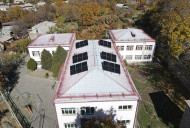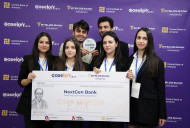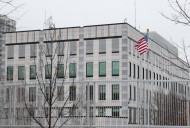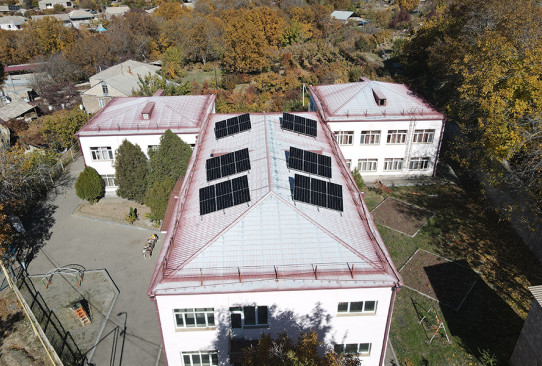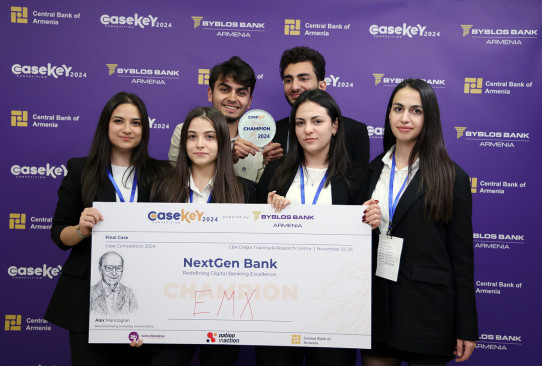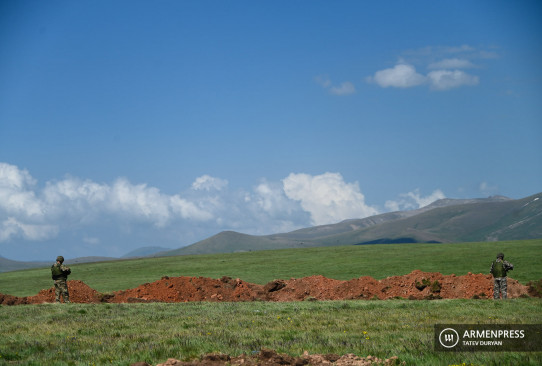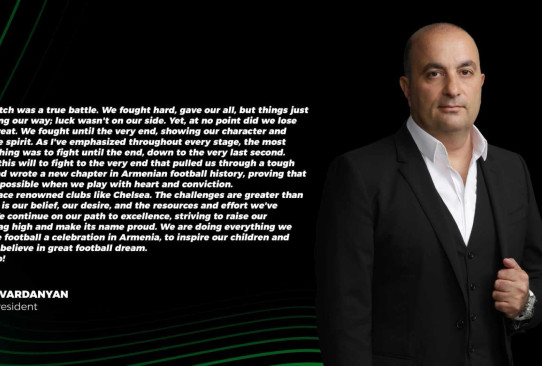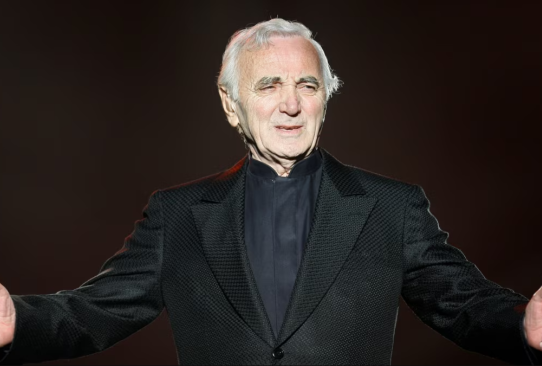Cancer diagnosis without biopsy? Now possible
Stanford University researchers say they have developed an ultrasensitive method to detect and quantify circulating tumor DNA (ctDNA) in patients.
Telltale traces of a tumor are often present in the blood. These traces - either intact cancer cells or fragments of tumor DNA - are present in minuscule amounts, but numerous companies are now coming to market with sophisticated tests that can detect and analyze them.
The method could be used not only to diagnose many types of solid tumors using a blood sample but also to monitor treatment response, detect minimal residual disease and emerging resistance mutations to targeted therapies, "and potentially even for noninvasive cancer screening," co–senior author Maximilian Diehn, MD, PhD, assistant professor of radiation oncology at Stanford, told Medscape Medical News.
"We set out to develop a method that overcomes two major hurdles in the circulating tumor DNA field," said Maximilian Diehn. "First, the technique needs to be very sensitive to detect the very small amounts of tumor DNA present in the blood. Second, to be clinically useful it's necessary to have a test that works off the shelf for the majority of patients with a given cancer."
The researchers describe their findings in a paper ("An ultrasensitive method for quantitating circulating tumor DNA with broad patient coverage") published online in Nature Medicine.
The method developed by the Stanford researchers ― dubbed CAncer Personalized Profiling by deep Sequencing, or CAPP-Seq ― is the first next-generation sequencing-based method for ctDNA analysis that achieves "both an ultra low detection limit and broad patient coverage at a reasonable cost," the researchers say.
"We're trying to develop a general method to detect and measure disease burden," added Ash Alizadeh, M.D., Ph.D., a hematologist and oncologist. "Blood cancers like leukemias can be easier to monitor than solid tumors through ease of access to the blood. By developing a general method for monitoring circulating tumor DNA, we're in effect trying to transform solid tumors into liquid tumors that can be detected and tracked more easily."
"The vast majority of circulating DNA is from normal, noncancerous cells, even in patients with advanced cancer," pointed out Scott Bratman, M.D., Ph.D. "We needed a comprehensive strategy for isolating the circulating DNA from blood and detecting the rare, cancer-associated mutations. To boost the sensitivity of the technique, we optimized methods for extracting, processing and analyzing the DNA".
The researchers' technique is sensitive enough to detect just one molecule of tumor DNA in a sea of 10,000 healthy DNA molecules in the blood.
"We detected ctDNA [circulating tumor DNA] in 100% of patients with stage II–IV NSCLC and in 50% of patients with stage I, with 96% specificity for mutant allele fractions down to ~0.02%," wrote the investigators. "Levels of ctDNA were highly correlated with tumor volume and distinguished between residual disease and treatment-related imaging changes, and measurement of ctDNA levels allowed for earlier response assessment than radiographic approaches.
Finally, we evaluated biopsy-free tumor screening and genotyping with CAPP-Seq. We envision that CAPP-Seq could be routinely applied clinically to detect and monitor diverse malignancies, thus facilitating personalized cancer therapy."
They also demonstrated the prognostic potential of CAPP-Seq. In 1 patient treated with radiotherapy for stage IIB NSCLC, follow-up imaging showed a large mass that was thought to represent residual disease.
According to Dr. Diehn, there are currently no reliable biomarkers available for lung cancer patients, which is the most common cancer and No. 1 cause of cancer deaths. "We are very excited about our findings because a personalized, clinically useful biomarker could revolutionize how we detect and manage this devastating disease," he said.
"Technically, CAPP-Seq involves sequencing a small portion of the genome that contains recurrent mutations in the cancer of interest. In its most basic implementation, we first identify the unique set of mutations in a patient's tumor by sequencing its DNA and then measure the presence of those mutations in circulating DNA," Dr. Diehn told Medscape Medical News.
"CAPP-Seq creates a personalized biomarker for every patient. We designed the approach to be directly applicable to the vast majority of patients with a given cancer type so that no patient - specific optimization is required to use it. We believe that this will be very important for facilitating clinical implementation of circulating tumor DNA analysis," he added.
Approached for comment, Luis Diaz Jr, MD, of the Johns Hopkins Sidney Kimmel Comprehensive Cancer Center in Baltimore, Maryland, said, "I think this is a really cool area. It's something I have been involved in for about 10 years, and it's now catching momentum."
Dr. Diaz, who was not involved in the Stanford research, said this article does a "good job, like many before it, to show that circulating tumor DNA is a viable diagnostic test, not only for tracking mutations in advanced patients but possibly also for screening. I really think there is a future for this in cancer."
The method is "complicated," he admitted, "but no more complicated than sequencing the tumor."
But Frank J. Rauscher III, PhD, deputy director for basic science at the Wistar Institute Cancer Center in Philadelphia, Pennsylvania, has reservations about whether this approach will ever reach the clinic.
"It's a technical feat," he said, "but I don't see physicians making treatment decisions based on this type of data. I am still a skeptic about DNA markers in blood. A protein marker will likely be much more specific and easier to detect and quantify," Dr. Rauscher told Medscape Medical News. "And unless it can detect small stage I tumors in non-high-risk people, it's not going to be much use."
"If we can monitor the evolution of the tumor and see the appearance of treatment-resistant subclones, we could potentially add or switch therapies to target these cells," Dr. Diehn argues in the news release. "It's also possible we could use CAPP-Seq to identify subsets of early-stage patients who could benefit most from additional treatment after surgery or radiation, such as chemotherapy or immunotherapy," he added.
The researchers are now designing clinical trials to see whether CAPP-Seq can improve patient outcomes and decrease costs.
Although this study focused on NSCLC, the researchers think their method could be applied to other tumors for which recurrent mutation data are available. "This approach could, theoretically, work for any tumor. We expect it to be broadly applicable across cancers," Ash Alizadeh, MD, PhD, assistant professor of medicine at Stanford, and co–senior author, said in the release.
Dr. Diehn told Medscape Medical News, "From a technical standpoint, CAPP-Seq is ready for clinical implementation. Of course, there are important regulatory requirements that have to be followed for tests that could be used to alter patient management, and we are already working to address these. Additionally, while CAPP-Seq is relatively inexpensive, widespread clinical use would require insurance coverage."
While the usefulness of the tests still needs to be proved, proponents say that because liquid biopsies are not invasive, they can be easier to repeat periodically, potentially tracking the disease as it evolves and allowing treatments to be adjusted accordingly.
Some developers think that such blood tests might one day be used to screen healthy people, providing early detection of a wide variety of cancers, not just a single type as with mammograms or PSA tests. Similar technology has already transformed prenatal testing.
Down syndrome and other chromosomal abnormalities can now be detected in a fetus by analyzing fetal DNA in a sample of a pregnant woman's blood. Such testing appears to be leading to a decline in such invasive tests as amniocentesis.
"You will have a chance to identify a treatment sometimes and sometimes not," said Dr. Massimo Cristofanilli, director of the breast care center at Thomas Jefferson University in Philadelphia.
Videos
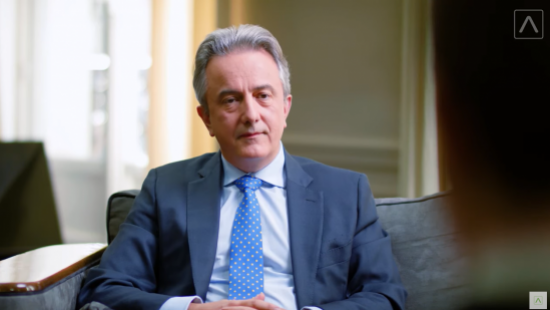
Interview with Francis Malige, EBRD Managing Director
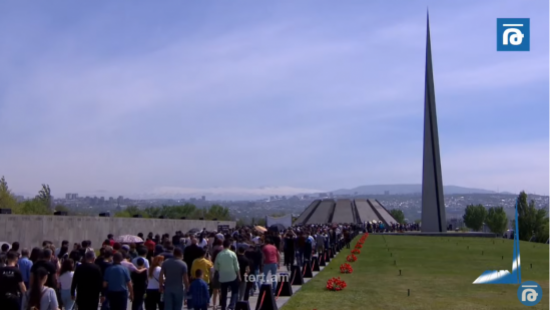
Armenians Commemorating 106th Anniversary of Genocide

Biden Under Pressure to Recognize Armenian Genocide - KTLA 5 News

Governance and Oversight Capacities Account for Our Bank's Robust Management System - Philip Lynch, Independent Board Member at Ameriabank

'Mr. President, It Is Now in Your Power to Right Decades of Denial' - US Congressman Adam Schiff Urges Joe Biden to Recognize Armenian Genocide
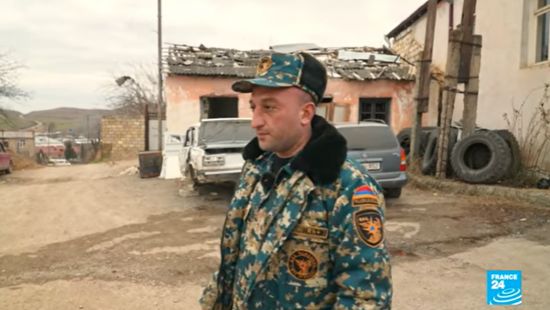
Armenians of Nagorno-Karabakh in Despair After Trauma of Military Defeat - France 24
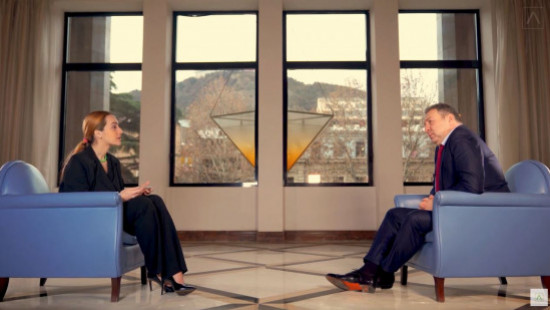
Interview with Kakhaber Kiknavelidze, an Independent Member of Ameriabank Board of Directors

Only Terrorists Keep Hostages, Putting Forward Preconditions for Their Release - Edmon Marukyan

Rep Adam Schiff Says Congress Should Recognize Artsakh

UN's Guterres Issues Global Appeal to Make 2021 'Year of Healing'

NASA's Mars 2020 Perseverance Rover Landing Animations

Azerbaijan Uses Prohibited Phosphorus Chemical Munitions - Defense Army Video

Artsakh Defense Army Units Neutralizing Azerbaijani Arms Supplies

Artsakh Defense Army Units Neutralizing Azerbaijani Drone
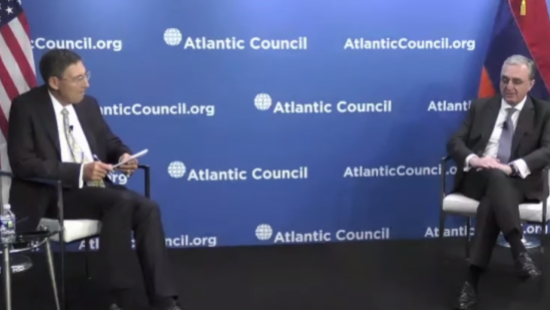
Nagorno-Karabakh's Status Has Been At the Heart of Our Approach - Zohrab Mnatsakanyan

Artsakh Defense Army Releases Video Featuring Damaged Azerbaijani Military Equipment

Artsakh Defense Army Units Inflicting Manpower Losses on Azerbaijan

Gas Pipeline Damaged in Azerbaijani Fire Targeting Nagorno-Karabakh's Capital

President Armen Sarkissian Meets Emmanuel Macron at Élysée Palace

Artsakh Defense Army Neutralizes Azerbaijani Military Hardware
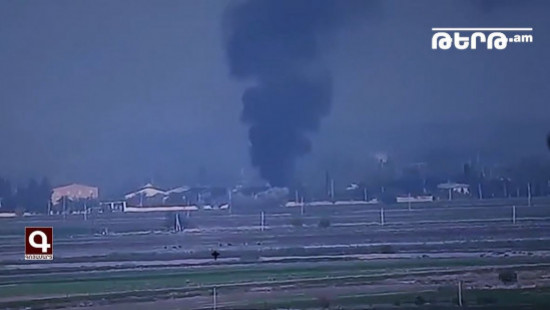
Artsakh Defense Army Units Neutralizing Azerbaijani Military Infrastructures

President Armen Sarkissian Meets with NATO Secretary-General in Brussels
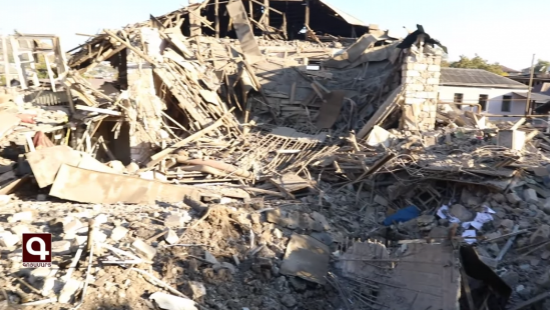
Buildings and Homes Lying in Ruins in Nagorno-Karabakh's Capital After Azerbaijani Shelling
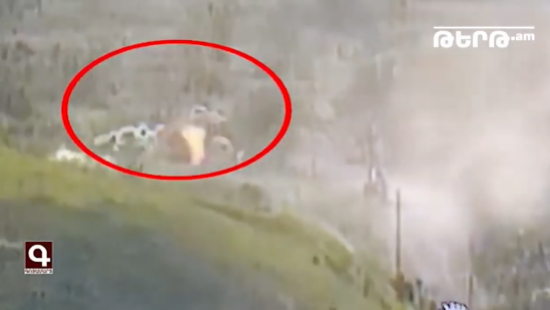
Artsakh Defense Army's Precision Fire Gives Deadly Blow to Enemy
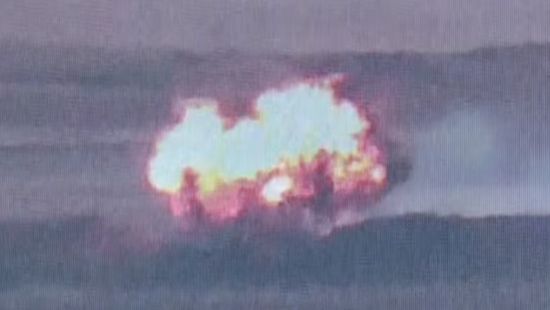
Artsakh Defense Army Units Destroying Azerbaijani Tank

Zohrab Mnatsakanyan: Ceasefire Does not Mandate Azerbaijan to Kill Civilians and Hit Civilian Settlements
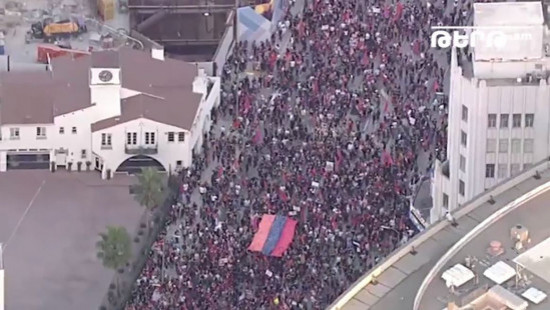
Armenians Protest Outside Turkrish Embassy in Los Angeles
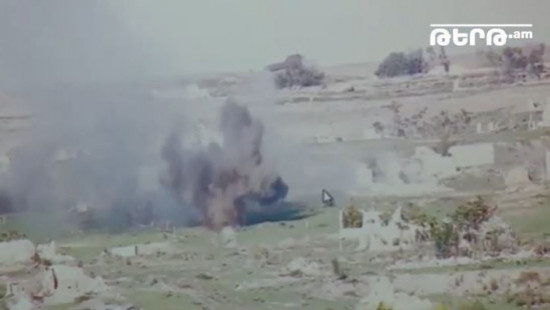
Losses in Azerbaijan's Military Featured in Defense Army Footage
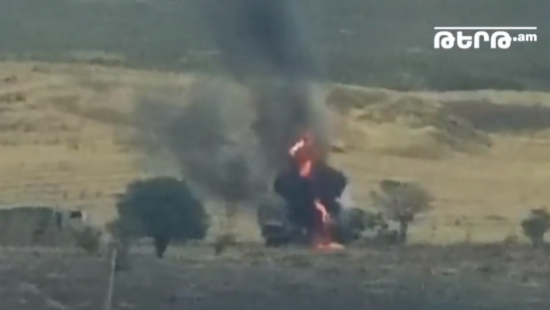
Artsakh Defense Army Neutralizing Adversary's Transport Column
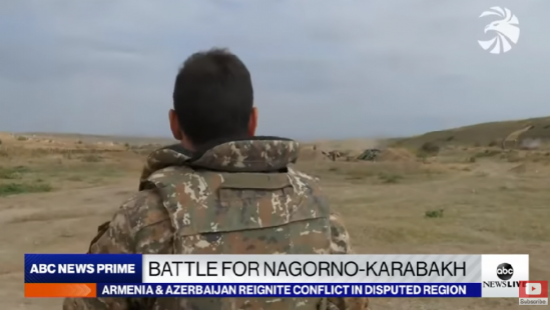
Turkey openly backs Azerbaijan 'far more aggressively than in the past' - ABC News on Syrian mercenaries fighting in Karabakh
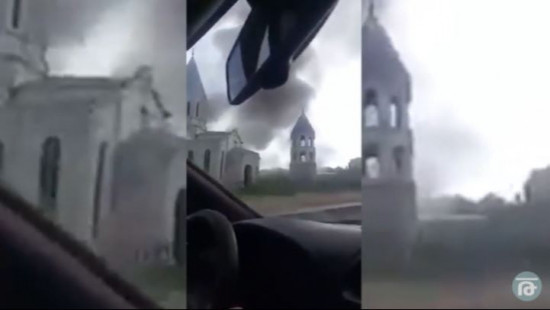
Iconic Armenian Church Hit in Azerbaijani Attacks in Nagorno-Karabakh City (photos)
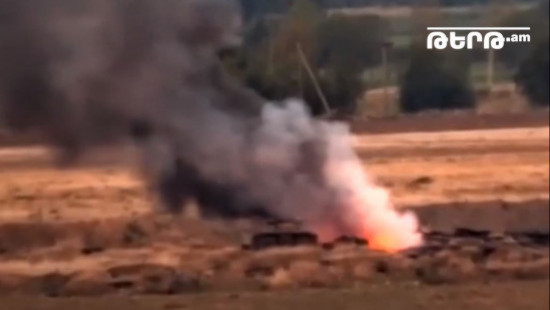
Artsakh Defense Army Continues High-Precision Strikes
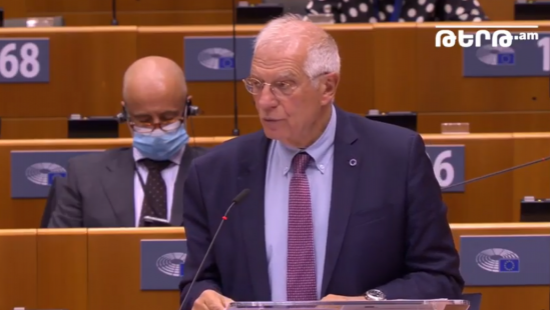
War Situation in Karabakh on European Parliament's Agenda
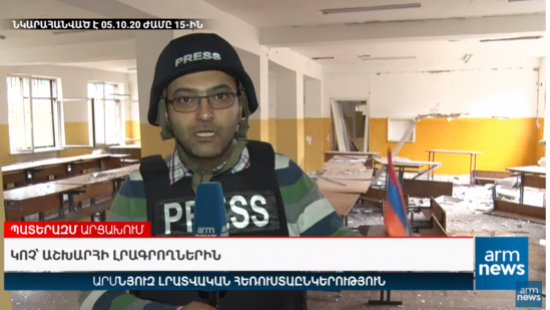
Call for Urgent Action: Armenian Journalist Brings Intn'l Colleagues' Attention to Situation iin Artsakh After Azerbaijani Attacks
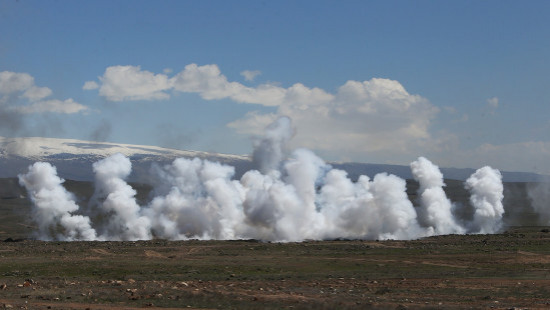
Turkey's Support to Syrian Mercenaries Fighting Against Artsakh: Facts About Azerbaijani Aggression
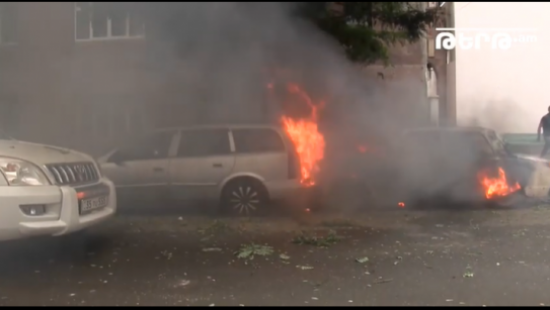
Nagorno-Karabakh's Capital Under Azerbaijani Strikes
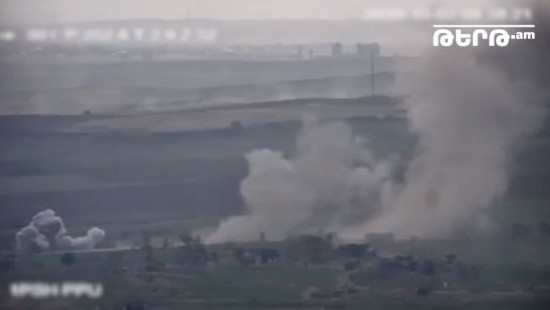
Armenian Armed Forces Neutralize Azerbaijani Defense Positions
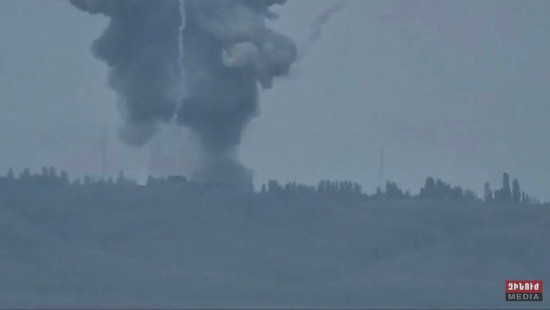
ArmenianTroops Destroy Azerbaijani Armored Fighting Vehicle on Frontline
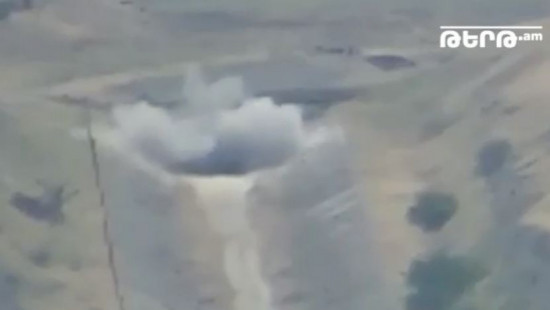
There is a solid evidence that Azerbaijan has launched a thoroughly planned attack on the NKR
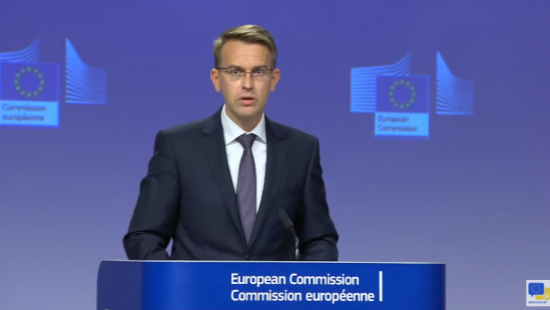
EU calls for Immediate End to Hostilities over Nagorno-Karabakh
-
 15:20 • 24.05.21
Interview with Francis Malige, EBRD Managing Director
15:20 • 24.05.21
Interview with Francis Malige, EBRD Managing Director
-
 11:39 • 24.04.21
Armenians Commemorating 106th Anniversary of Genocide
11:39 • 24.04.21
Armenians Commemorating 106th Anniversary of Genocide
-
 09:40 • 23.04.21
Biden Under Pressure to Recognize Armenian Genocide - KTLA 5 News
09:40 • 23.04.21
Biden Under Pressure to Recognize Armenian Genocide - KTLA 5 News
-
 15:34 • 22.04.21
Governance and Oversight Capacities Account for Our Bank's Robust Management System - Philip Lynch, Independent Board Member at Ameriabank
15:34 • 22.04.21
Governance and Oversight Capacities Account for Our Bank's Robust Management System - Philip Lynch, Independent Board Member at Ameriabank
-
 14:09 • 21.04.21
'Mr. President, It Is Now in Your Power to Right Decades of Denial' - US Congressman Adam Schiff Urges Joe Biden to Recognize Armenian Genocide
14:09 • 21.04.21
'Mr. President, It Is Now in Your Power to Right Decades of Denial' - US Congressman Adam Schiff Urges Joe Biden to Recognize Armenian Genocide
-
 12:37 • 03.04.21
Armenians of Nagorno-Karabakh in Despair After Trauma of Military Defeat - France 24
12:37 • 03.04.21
Armenians of Nagorno-Karabakh in Despair After Trauma of Military Defeat - France 24
-
 17:33 • 11.03.21
Interview with Kakhaber Kiknavelidze, an Independent Member of Ameriabank Board of Directors
17:33 • 11.03.21
Interview with Kakhaber Kiknavelidze, an Independent Member of Ameriabank Board of Directors
-
 17:57 • 26.01.21
Only Terrorists Keep Hostages, Putting Forward Preconditions for Their Release - Edmon Marukyan
17:57 • 26.01.21
Only Terrorists Keep Hostages, Putting Forward Preconditions for Their Release - Edmon Marukyan
-
 13:33 • 22.01.21
Rep Adam Schiff Says Congress Should Recognize Artsakh
13:33 • 22.01.21
Rep Adam Schiff Says Congress Should Recognize Artsakh
-
 09:42 • 29.12.20
UN's Guterres Issues Global Appeal to Make 2021 'Year of Healing'
09:42 • 29.12.20
UN's Guterres Issues Global Appeal to Make 2021 'Year of Healing'
-
 18:41 • 24.12.20
NASA's Mars 2020 Perseverance Rover Landing Animations
18:41 • 24.12.20
NASA's Mars 2020 Perseverance Rover Landing Animations
-
 13:33 • 31.10.20
Azerbaijan Uses Prohibited Phosphorus Chemical Munitions - Defense Army Video
13:33 • 31.10.20
Azerbaijan Uses Prohibited Phosphorus Chemical Munitions - Defense Army Video
-
 16:37 • 30.10.20
Artsakh Defense Army Units Neutralizing Azerbaijani Arms Supplies
16:37 • 30.10.20
Artsakh Defense Army Units Neutralizing Azerbaijani Arms Supplies
-
 11:25 • 28.10.20
Artsakh Defense Army Units Neutralizing Azerbaijani Drone
11:25 • 28.10.20
Artsakh Defense Army Units Neutralizing Azerbaijani Drone
-
 13:45 • 24.10.20
Nagorno-Karabakh's Status Has Been At the Heart of Our Approach - Zohrab Mnatsakanyan
13:45 • 24.10.20
Nagorno-Karabakh's Status Has Been At the Heart of Our Approach - Zohrab Mnatsakanyan
-
 11:51 • 24.10.20
Artsakh Defense Army Releases Video Featuring Damaged Azerbaijani Military Equipment
11:51 • 24.10.20
Artsakh Defense Army Releases Video Featuring Damaged Azerbaijani Military Equipment
-
 11:40 • 24.10.20
Artsakh Defense Army Units Inflicting Manpower Losses on Azerbaijan
11:40 • 24.10.20
Artsakh Defense Army Units Inflicting Manpower Losses on Azerbaijan
-
 10:39 • 24.10.20
Gas Pipeline Damaged in Azerbaijani Fire Targeting Nagorno-Karabakh's Capital
10:39 • 24.10.20
Gas Pipeline Damaged in Azerbaijani Fire Targeting Nagorno-Karabakh's Capital
-
 12:41 • 23.10.20
President Armen Sarkissian Meets Emmanuel Macron at Élysée Palace
12:41 • 23.10.20
President Armen Sarkissian Meets Emmanuel Macron at Élysée Palace
-
 12:16 • 23.10.20
Artsakh Defense Army Neutralizes Azerbaijani Military Hardware
12:16 • 23.10.20
Artsakh Defense Army Neutralizes Azerbaijani Military Hardware
-
 12:02 • 22.10.20
Artsakh Defense Army Units Neutralizing Azerbaijani Military Infrastructures
12:02 • 22.10.20
Artsakh Defense Army Units Neutralizing Azerbaijani Military Infrastructures
-
 10:35 • 22.10.20
President Armen Sarkissian Meets with NATO Secretary-General in Brussels
10:35 • 22.10.20
President Armen Sarkissian Meets with NATO Secretary-General in Brussels
-
 10:51 • 17.10.20
Buildings and Homes Lying in Ruins in Nagorno-Karabakh's Capital After Azerbaijani Shelling
10:51 • 17.10.20
Buildings and Homes Lying in Ruins in Nagorno-Karabakh's Capital After Azerbaijani Shelling
-
 15:09 • 15.10.20
Artsakh Defense Army's Precision Fire Gives Deadly Blow to Enemy
15:09 • 15.10.20
Artsakh Defense Army's Precision Fire Gives Deadly Blow to Enemy
-
 13:13 • 13.10.20
Artsakh Defense Army Units Destroying Azerbaijani Tank
13:13 • 13.10.20
Artsakh Defense Army Units Destroying Azerbaijani Tank
-
 12:56 • 12.10.20
Zohrab Mnatsakanyan: Ceasefire Does not Mandate Azerbaijan to Kill Civilians and Hit Civilian Settlements
12:56 • 12.10.20
Zohrab Mnatsakanyan: Ceasefire Does not Mandate Azerbaijan to Kill Civilians and Hit Civilian Settlements
-
 12:23 • 12.10.20
Armenians Protest Outside Turkrish Embassy in Los Angeles
12:23 • 12.10.20
Armenians Protest Outside Turkrish Embassy in Los Angeles
-
 17:23 • 09.10.20
Losses in Azerbaijan's Military Featured in Defense Army Footage
17:23 • 09.10.20
Losses in Azerbaijan's Military Featured in Defense Army Footage
-
 15:53 • 09.10.20
Artsakh Defense Army Neutralizing Adversary's Transport Column
15:53 • 09.10.20
Artsakh Defense Army Neutralizing Adversary's Transport Column
-
 14:11 • 09.10.20
Turkey openly backs Azerbaijan 'far more aggressively than in the past' - ABC News on Syrian mercenaries fighting in Karabakh
14:11 • 09.10.20
Turkey openly backs Azerbaijan 'far more aggressively than in the past' - ABC News on Syrian mercenaries fighting in Karabakh
-
 15:52 • 08.10.20
Iconic Armenian Church Hit in Azerbaijani Attacks in Nagorno-Karabakh City (photos)
15:52 • 08.10.20
Iconic Armenian Church Hit in Azerbaijani Attacks in Nagorno-Karabakh City (photos)
-
 10:57 • 08.10.20
Artsakh Defense Army Continues High-Precision Strikes
10:57 • 08.10.20
Artsakh Defense Army Continues High-Precision Strikes
-
 14:24 • 07.10.20
War Situation in Karabakh on European Parliament's Agenda
14:24 • 07.10.20
War Situation in Karabakh on European Parliament's Agenda
-
 19:31 • 05.10.20
Call for Urgent Action: Armenian Journalist Brings Intn'l Colleagues' Attention to Situation iin Artsakh After Azerbaijani Attacks
19:31 • 05.10.20
Call for Urgent Action: Armenian Journalist Brings Intn'l Colleagues' Attention to Situation iin Artsakh After Azerbaijani Attacks
-
 16:17 • 04.10.20
Turkey's Support to Syrian Mercenaries Fighting Against Artsakh: Facts About Azerbaijani Aggression
16:17 • 04.10.20
Turkey's Support to Syrian Mercenaries Fighting Against Artsakh: Facts About Azerbaijani Aggression
-
 12:39 • 04.10.20
Nagorno-Karabakh's Capital Under Azerbaijani Strikes
12:39 • 04.10.20
Nagorno-Karabakh's Capital Under Azerbaijani Strikes
-
 13:49 • 03.10.20
Armenian Armed Forces Neutralize Azerbaijani Defense Positions
13:49 • 03.10.20
Armenian Armed Forces Neutralize Azerbaijani Defense Positions
-
 10:12 • 29.09.20
ArmenianTroops Destroy Azerbaijani Armored Fighting Vehicle on Frontline
10:12 • 29.09.20
ArmenianTroops Destroy Azerbaijani Armored Fighting Vehicle on Frontline
-
 23:42 • 28.09.20
There is a solid evidence that Azerbaijan has launched a thoroughly planned attack on the NKR
23:42 • 28.09.20
There is a solid evidence that Azerbaijan has launched a thoroughly planned attack on the NKR
-
 18:45 • 28.09.20
EU calls for Immediate End to Hostilities over Nagorno-Karabakh
18:45 • 28.09.20
EU calls for Immediate End to Hostilities over Nagorno-Karabakh
Most popular articles Today Yesterday For a week
Economy
-
11:33 • 21.11.24 Unibank to Issue Subordinated Bonds for the First Time in Armenia
-
16:51 • 11.11.24 New features for Armeconombank’s Premium cardholders
Event
-
11:50 • 20.11.24 US embassy in Kyiv shuts down over anticipated air attack
-
14:40 • 19.11.24 Ucom’s 5G network launched in 11 new cities
Science/tech
-
14:18 • 08.05.24 AstraZeneca withdrawing Covid vaccine worldwide


